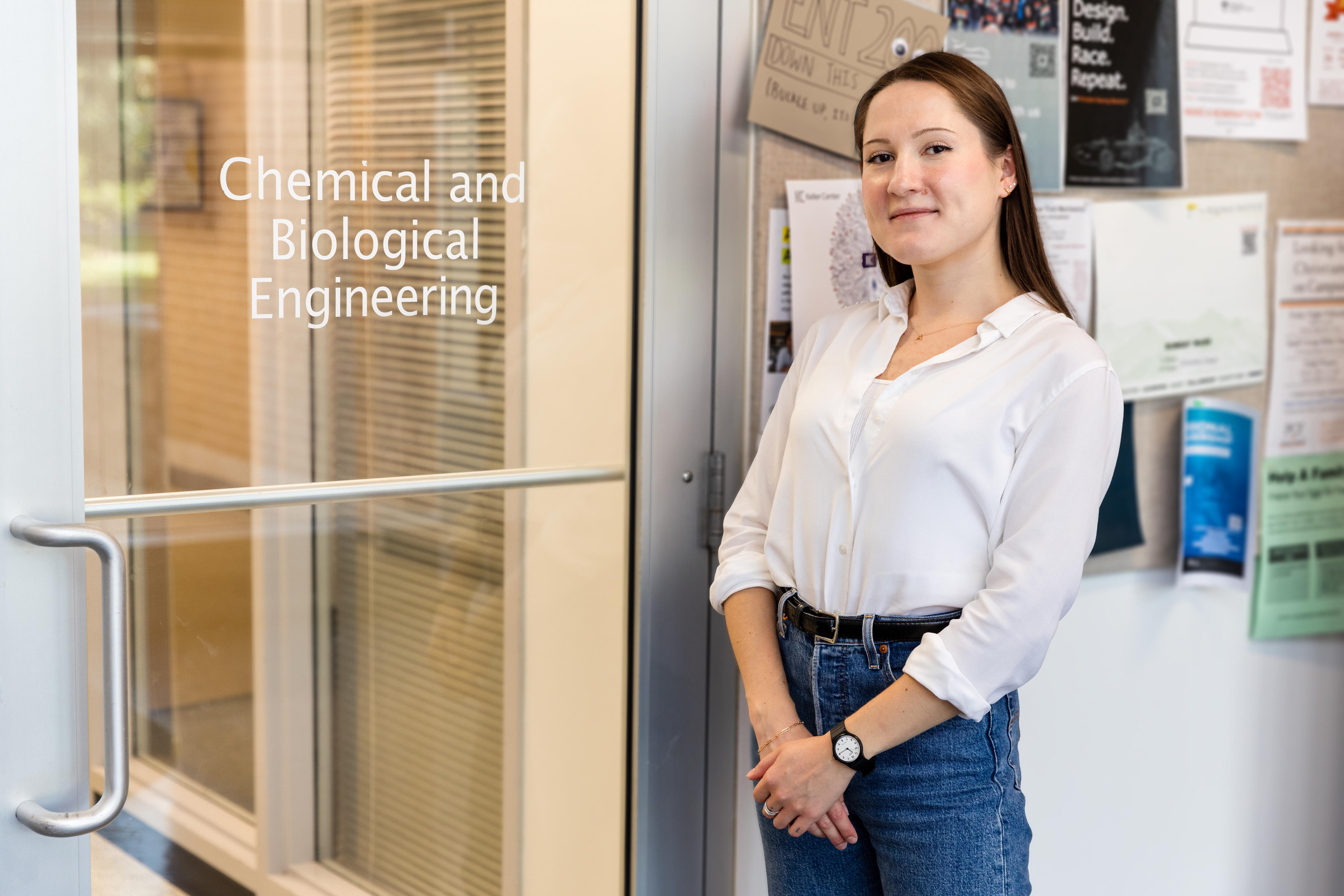Exploring the Intricate World of Cellular Processes: A PhD's Path From Moscow to Princeton Via NJIT

Alina Emeilianova worked right up to her Ph.D graduation ceremony. Appearing as first author in a paper in Langmuir, a peer-reviewed journal published by the American Chemical Society, it is fitting that she snuck in one more notch of success in the twilight of her research career at New Jersey Institute of Technology. Technically this was submitted after her defense — some people just can’t turn it off.
Success is a byproduct of hard work and dedication, both of which were abundant during Emelianova’s time as a doctoral student at NJIT. Driven by a passion for computational methodologies and a desire to explore new horizons, she achieved numerous successes here — eight peer-reviewed paper publications, three different research areas and a handful of academic awards. Emelianova is now conducting research in one of the world’s preeminent research groups at Princeton University.
Emelianova's foray into the realm of academic research began at National Research Nuclear University MEPhI in Moscow, where she conducted experimental investigations focused on fluids confined in nanoporous materials. This early work laid the foundation for her future endeavors, igniting a curiosity for the complex interplay of molecules and materials that would become an area of expertise.
High-Impact Research at NJIT
Emelianova sought new challenges where she could push modeling and computational boundaries. It was at NJIT that Emelianova found the perfect environment to cultivate this passion. With an abundance of experimental and modeling research opportunities, NJIT faculty offered inspiration, guidance and support.
Irina Molodetsky and Alexei Khalizov “left a mark” on her academic growth, though it was under the mentorship and advisement of professor Gennady Gor that made the biggest impression.

“His profound impact on my development as a scientist cannot be overstated. His support and guidance pushed me to think critically and seek innovative solutions, shaping the researcher I am today,” she said.
They conducted pioneering research on adsorption-induced deformation of nanoporous materials, including zeolites and metal-organic frameworks (MOFs). Zeolites possess well-defined pores and cavities, making them exceptional molecular sieves for applications such as gas separation and water purification. MOFs, consisting of metal ions interconnected by organic linkers, offer unparalleled tunability, enabling tailored properties like tunable pore sizes and high surface areas.
Through her exploration of these porous materials, Emelianova stands at the forefront of advancing knowledge and showcasing the profound impact of materials science on real-world challenges and innovation in energy, defense and healthcare sectors.
‘Cutting Her Teeth’ in Real-World Application
A unique co-op program with Colgate brought her face-to-face with real-world application of her research. Her computational investigations into interactions between amino acids in toothpaste mixtures and the dentin surface not only showcased her versatility as a researcher but also sparked a newfound interest in the fascinating realm of biological systems.
Using molecular simulations, Emelianova researched how different components in toothpaste changed the desired impact for treating dentin hypersensitivity. Through this research, she helped create knowledge that will guide formulations of new oral care products.
"This experience at Colgate was a turning point in my academic journey. I was amazed at the potential for computational methods to address real-world challenges, and it sparked my passion for studying biological systems," Emelianova said.
Understanding Cellular Processes to Improve Healthcare
This passion set Emelianova on a path to pursue postdoctoral studies in biomolecular engineering, ultimately leading her to Princeton University's renowned Joseph Group for Computational Biophysics and Bioengineering. Emelianova delved into exploring phase separations in cells and investigating treatments targeting condensate-linked diseases. Expertise in computational approaches has proven invaluable in understanding cellular processes, and their research holds immense promise for advancing medical science and healthcare.
Emelianova’s technical foundation in computational modeling has proven to be an exceptional fit in Joseph’s research group. A primary focus for the group is further understanding of biomolecular condensates, a distinct class of intracellular compartments that play crucial roles in both health and disease. By exploring these structures with sub-molecular precisions, they can uncover fundamental principles governing their characteristics.
“Beyond her technical skills, Alina’s creativity and distinct viewpoint have enriched the group dynamics,” said Jerelle Joseph, assistant professor and principal investigator of the research group. “Her quick learning ability and unwavering enthusiasm for exploring new avenues make her an ideal collaborator. I am genuinely excited about the prospects of our collaborative work together.”

An Advocate and Mentor
Emelianova’s prolific research, publishing numerous articles and actively participating in prestigious conferences, tells just part of her story. She’s also a selfless collaborator and has embraced the responsibilities of being a representative for current and future scientists. Her collaborative nature has fostered a global network of peers, she set an example as a mentor for undergraduate and high school students and she was an active Graduate Student Association member during her time here.
Emelianova said that it was difficult at first to strike the balance between support and inspiration, and letting young researchers tackle difficult matters on their own. She credits her mentees, which allowed her to both expand her critical thinking and have fun throughout the process.
“I believe that science is a fun and creative process and this is the philosophy I try to use as a mentor,” she said.
Emelianova's aspirations remain ambitious yet rooted in the desire to make a lasting impact. With a focus on understanding disease mechanisms at the cellular level, they aim to contribute to the development of therapies for currently untreatable illnesses. Her passion for research, coupled with an unwavering commitment to advancing knowledge, promises to transform the landscape of medical science and healthcare.